7 Wonders is a captivating strategy board game that challenges players to build and develop their own civilization throughout ancient history. With its unique card drafting mechanics, diverse strategies, and multiple paths to victory, this award-winning game is known for its depth, replayability, and broad appeal. In this guide, you will delve into the various aspects of 7 Wonders, including the game’s objective, components, setup, and player roles. By mastering the intricacies of each game Age, learning efficient card drafting tactics, and building a balanced strategy, you will be well on your way to claiming victory over your opponents and marking your place in history.
Understanding the game’s objective
Introduction
7 Wonders is a card drafting and civilization building board game for 3-7 players. The game is played over three Ages, and the objective is to collect Victory Points (VP) by building various structures and Wonders. The player with the most VP at the end of the third Age wins the game. In this guide, you’ll learn how to play 7 Wonders and understand its main goal and purpose.
Game Objective
The main goal of 7 Wonders is to accumulate the most Victory Points by the end of the game. Players earn Victory Points through a variety of means, such as building structures, developing their military, researching science, earning money, and constructing Wonders.
Game Components
Before diving into the gameplay, it’s essential to familiarize yourself with the game’s components. 7 Wonders consists of:
- 7 Wonder boards, each representing an ancient Wonder of the World.
- 3 decks of cards, one for each Age (I, II, and III).
- 46 Conflict tokens (military Victory and Defeat tokens).
- 46 gold coins (20x value 3, and 26x value 1).
- 3 Progress tokens.
- 1 score pad to record Victory Points at the end of the game.
Game Setup
- Shuffle the 7 Wonder boards and deal one randomly to each player.
- Organize the 3 decks of cards according to Age (I, II, and III). Depending on the number of players, you’ll have to remove a certain number of cards from each Age deck. The rulebook will provide the required amount.
- Give each player 3 gold coins of value 1 and place the remaining gold coins nearby as the bank.
- Set aside the Conflict and Progress tokens within easy reach of all players.
Game Overview
The game takes place over three Ages, with each Age consisting of 6 rounds. In each Age, players will draft cards from a starting hand, simultaneously choose one card to keep, and pass the remaining cards to their neighbor. The selected cards will represent the structures built in their civilization and contribute to the player’s final Victory Point tally.
The 5 Types of Structures
- Raw Materials (brown cards): Produce resources used to build other structures.
- Manufactured Goods (gray cards): Produce goods needed for more advanced structures.
- Civilian Buildings (blue cards): Provide direct Victory Points.
- Scientific Structures (green cards): Grant research Victory Points based on sets of unique symbols.
- Military Structures (red cards): Improve a player’s military strength, leading to Victory or Defeat tokens at the end of each Age.
Building Your Civilization
During each round, players simultaneously choose one card from their hand to build in their civilization. To build a structure, a player must pay the required resources or goods displayed on the card. Many cards can be upgraded for free in later Ages based on the structures built in previous Ages.
Players can also choose to use their selected card to construct a stage of their Wonder or discard the card for 3 gold coins.
End of an Age
After each player has played 6 cards in the current Age, the Age ends. Players now compare their military strength with their two neighbors (left and right). Based on the military comparison, players receive Conflict tokens, which grant or subtract Victory Points.
End of Game Scoring
After the third Age, the game ends. Players calculate their total Victory Points earned from their structures, military success, gold coins, and Wonders. The player with the most Victory Points is declared the winner and ruler of the greatest civilization in history!
Closing
Now that you have an understanding of the game’s objective and how to play, gather some friends and start exploring the exciting world of 7 Wonders. Good luck, and may the best civilization win!
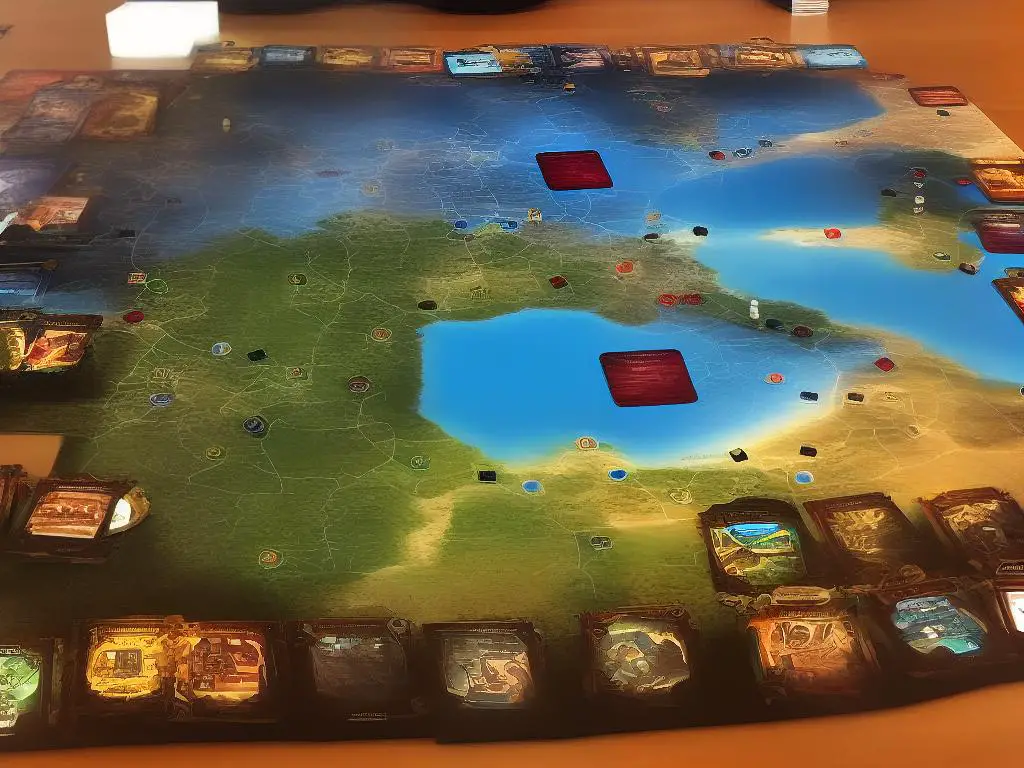
Familiarizing with the game components
Introduction
7 Wonders is a popular board game that accommodates 2-7 players, focusing on resource management, strategy, and interaction among players. The game is set in ancient civilizations, where players strategically develop their cities, construct Wonders, and gain Victory Points to win. The game consists of three Ages, and each Age has a deck of development cards. The goal is to have the most Victory Points at the end of the third Age.
To get started with playing 7 Wonders, it’s essential to familiarize yourself with the different game components, including cards, boards, tokens, and other game pieces involved. This guide will help you understand each component and its function within the game.
Wonders
Wonders are the central component of the game, as each player represents a civilization trying to build one of these majestic structures. Each player receives a Wonder board at the beginning of the game, representing one of the seven Wonders of the ancient world – the Great Pyramid of Giza, the Hanging Gardens of Babylon, the Temple of Artemis, the Colossus of Rhodes, the Lighthouse of Alexandria, the Mausoleum at Halicarnassus, and the Statue of Zeus.
Each Wonder board has a unique ability or feature that helps players progress throughout the game. Wonders follow three stages of construction, indicated by the three building slots on each board. Construction requires specific resources, which are shown on the bottom of the Wonder board.
Age Cards
Age cards are categorized into three decks, representing each of the three Ages in the game. The decks contain cards that players use to improve their cities and pursue various strategies. These cards include:
- Raw Material (brown) cards: Generate basic resources, such as wood, stone, clay, and ore.
- Manufactured Good (gray) cards: Produce manufactured goods like papyrus, glass, and textiles.
- Civilian Structure (blue) cards: Provide Victory Points at the end of the game.
- Scientific Structure (green) cards: Offer progress in three scientific domains (gear, compass, and tablet) to potentially score significant points.
- Commercial Structure (yellow) cards: Enhance trading mechanisms with adjacent players and can provide coins or Victory Points.
- Military Structure (red) cards: Strengthen a player’s military power, which affects Conflict tokens.
- Guild (purple) cards: Available only in Age III, these cards provide various benefits, many of them based on what other players are doing.
Conflict Tokens
Conflict tokens, also called Military Victory tokens, are circular red tokens with a number (1, 3, or 5) representing Victory Points. Military strength comes into play at the end of an Age, with players comparing their military power to immediately left and right neighbors. Based on the comparison, players gain, lose, or have no effect on these Conflict tokens, impacting their Victory Points.
Other Essential Game Pieces
- Coins: Represent currency in the game and are used to recruit military units, pay for card costs, and trade with neighbors.
- Science tokens: Available in some expansion packs, these tokens offer additional ways of gaining scientific advancements and provide Victory Points.
- Leader cards: Introduced in the 7 Wonders: Leaders expansion, these cards provide unique abilities and benefits, adding a layer of strategy to the game.
- Diplomacy tokens: Included in the 7 Wonders: Cities expansion, these tokens allow players to avoid military conflict for an Age.
- Debts: Also introduced in the 7 Wonders: Cities expansion, they can negatively impact a player’s score due to insufficient gold during trading or tax collection.
By familiarizing yourself with the various cards, boards, tokens, and game pieces involved in 7 Wonders, you’ll better understand the gameplay and experience a more enjoyable and strategic game with your friends. Enjoy building your civilization and competing to create the most impressive Wonder of the ancient world!
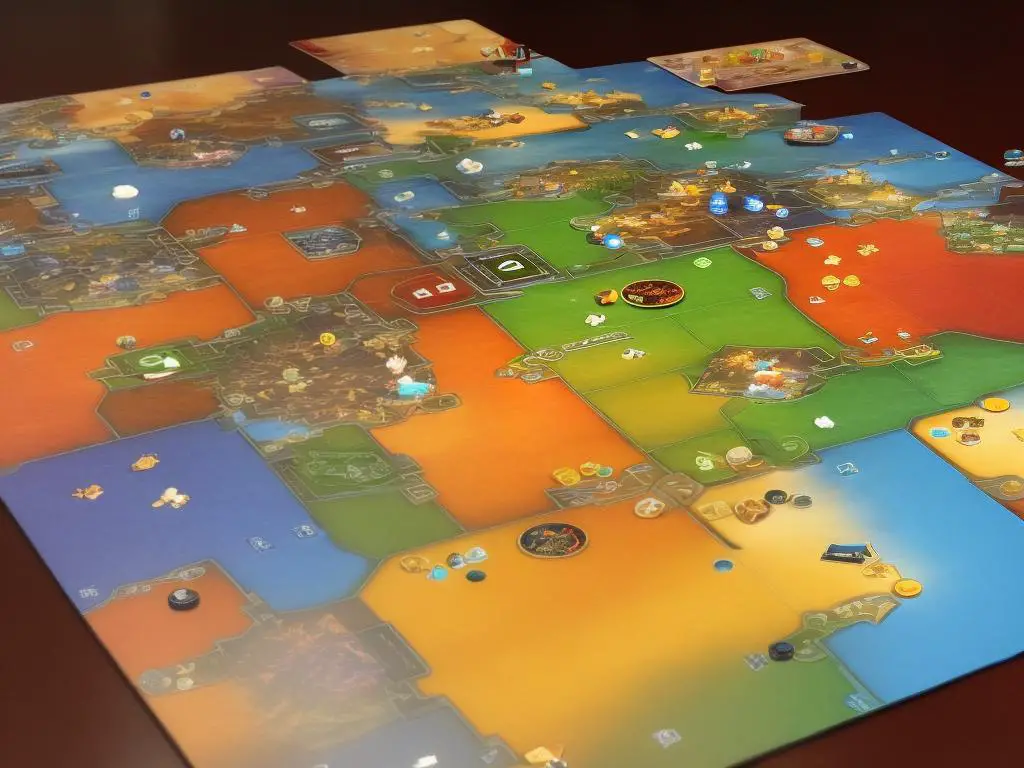
Learning the game setup and player roles
Introduction
7 Wonders is a strategic board game where players take on the role of leaders of great ancient civilizations, trying to achieve the most prosperous and developed city possible. The game is played over three rounds called “Ages” and uses a card-drafting mechanic, resource management, and building structures to earn points. This guide will help you understand how to set up the game and provide an overview of each player’s role.
Game Contents and Setup
First, place the game board in the center of the table. Each player will then choose a civilization (also known as a Wonder board) and place it in front of them. These are double-sided, allowing you to choose from two different wonders on each board. Make sure each player has a sufficient amount of space in front of them, as they will be placing cards there throughout the game.
The game contains three decks of cards, one for each Age (I, II, and III). Shuffle each deck separately and deal seven cards from the Age I deck to each player.
Prepare the military counters, coins, and other tokens in a central area, making sure each player can reach them.
Each player starts with three coins, collected from the general supply. Further coins will be earned throughout the game.
Player Roles and Card Drafting
The primary mechanic in 7 Wonders is card drafting. Your role as a player is to choose one card from your hand each turn, then pass the remaining cards to the player on your left or right, alternating directions each Age. You will have three main choices for using the cards:
- Construct the building: Pay the required resources and place the card in front of your Wonder board. Each card offers unique benefits, such as resources, victory points, or special abilities.
- Discard the card for coins: If you do not want to build the structure or cannot afford the resources, you can choose to discard the card for three coins, added to your existing supply.
- Build a stage of your Wonder: Some cards have a Wonder symbol on them, allowing you to use the resources to build a stage of your Wonder instead. Each wonder has three stages, and each stage provides additional victory points or unique benefits.
After all players have chosen and resolved their card actions, pass your remaining hand to the player on your left (for Age I). Repeat the drafting process until all cards have been played or discarded.
Resource Management
Resource management is the key to constructing buildings and wonders. Cards in your city will provide resources such as wood, stone, brick, or glass, for example. When constructing a building or wonder, you must have access to the required resources, either in your city or by trading with your neighbors (the players directly to your left and right).
To trade for a resource, pay two coins to the player you are trading with for each resource you need. Keep in mind that you can only trade for resources produced by brown and gray cards in their city.
Building Structures
As you draft cards and construct buildings in your city, carefully plan your strategy around the various card types:
- Resource cards (brown and gray): Produce the essential resources you need to build other structures and wonders.
- Civilian structures (blue): Provide victory points at the end of the game.
- Military structures (red): Increase your military power, which will be compared to your neighbors at the end of each Age, potentially granting (or losing) victory points.
- Scientific structures (green): Offer victory points based on sets of unique scientific symbols.
- Commercial structures (yellow): Provide various benefits, such as coins, resources, or reducing the cost of trading.
- Guilds (purple): Grant victory points based on specific conditions, such as the number of blue cards in neighboring cities.
Conclusion
At the end of the third Age, players will count their victory points based on their completed city structures, military victories and defeats, scientific advancements, and any other bonuses granted by their wonder or certain cards. The player with the highest total points is declared the winner.
Now that you know how to set up 7 Wonders and understand each player’s role, you can begin strategizing and building your most prosperous city. Good luck and happy gaming!
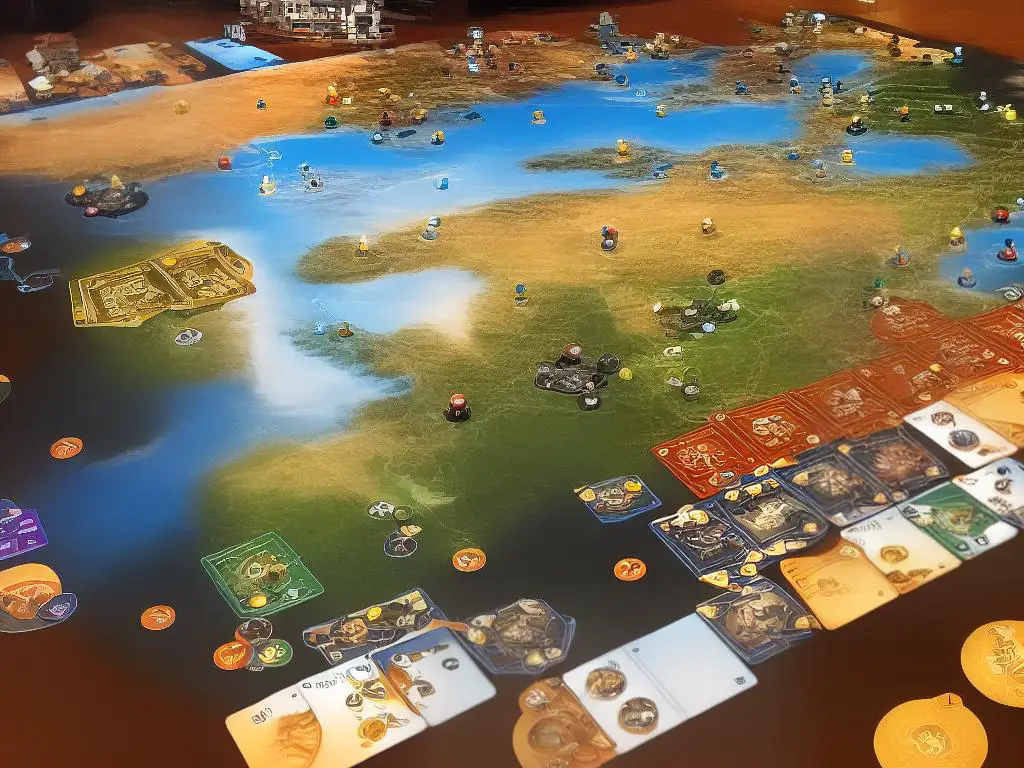
Mastering the three game Ages
Introduction
7 Wonders is a board game that allows players to take on the roles of ancient civilizations’ leaders and build your own city, making it the most powerful and advanced throughout the three Ages of the game. Players aim to gather resources, develop trade relationships and create powerful military forces, while balancing science, culture, and commercial interests. In this guide, we will explain how to play 7 Wonders, focusing on mastering the three game Ages.
Game Components
- 7 Wonder boards, one for each player
- 49 Age I cards
- 49 Age II cards
- 50 Age III cards
- 46 Conflict tokens
- 46 Coin tokens
- 1 score pad
Setup
- Each player selects a Wonder board, which represents their city and provides unique abilities.
- Shuffle the Age I cards, Age II cards, and Age III cards separately, then create three decks based on the number of players.
- Set out conflict tokens and coin tokens within reach of all players.
- Give each player three coins to start.
Playing the Game
7 Wonders is played over three Ages, with each Age using a different set of cards. At the beginning of each Age, players are dealt seven cards from the appropriate deck. Players will choose one card to play and then pass the remaining cards to the player on their left (right in Age II).
Age I – Foundational Cards
In the first Age, players mainly focus on gathering resources. The cards in Age I include:
- Raw Material cards (brown) – Provide basic resources like wood, stone, clay, and ore.
- Manufactured Goods cards (gray) – Provide manufactured resources like glass, papyrus, and textiles.
- Commercial STRUCTURE cards (yellow) – Give players bonuses, such as extra coins or resources.
- Military STRUCTURE cards (red) – Increase a player’s military power for conflicts.
- Scientific STRUCTURE cards (green) – Contribute to scientific research and grant victory points based on sets.
- Civic STRUCTURE cards (blue) – Grant players victory points.
Players should focus on obtaining a solid resource base during Age I to build more advanced cards in the later Ages.
Age II – Developing Your Civilization
In Age II, players continue to gather resources and build their cities. In addition to previous card types, Age II introduces the following types:
- Commercial STRUCTURE cards (yellow) – Introduce trade mechanics and diversify the economy.
- Guild cards (purple) – Grant victory points based on specific conditions (introduced in Age III, but players can plan ahead).
In this Age, players should start to cultivate a strategy based on their resources, Wonder board’s bonus, and their neighbors’ actions. Balancing military, science, and cultural development is essential in this stage of the game.
Age III – Victory Approaches
The third and final Age is when players try to solidify their lead or catch up to opponents. Age III cards are powerful and expensive, mainly guild cards that can yield high victory points. Be aware of the following card types in Age III:
- Guild cards (purple) – These cards grant victory points based on certain criteria, such as the number of military, civic, or commercial structures built.
- Leader cards – While Age III doesn’t introduce new leader cards, the most potent leader cards typically become available in this Age.
During Age III, players should focus on maximizing victory points by building structures that complement their existing strategies, using their wonder’s abilities, and efficiently spending their resources.
Scoring
At the end of Age III, players calculate their scores based on the following categories:
- Military conflicts – Points from victories and defeats during each Age’s conflicts.
- Wonder stages – Points granted by completed stages of a player’s wonder.
- Civic structures – Points provided by blue cards.
- Commercial structures – Points granted by some yellow cards.
- Scientific structures – Points earned from complete sets of green cards.
- Guilds – Points earned by meeting certain criteria on purple cards.
- Coins – One point for every three coins left.
The player with the highest score wins the game.
Conclusion
Now that you understand how to play 7 Wonders and master the three Ages, gather your friends and embark on a quest to build the most advanced and powerful civilization in history. Enjoy the strategic depth and replayability of 7 Wonders as you explore various strategies and synergies between different cards and wonders.
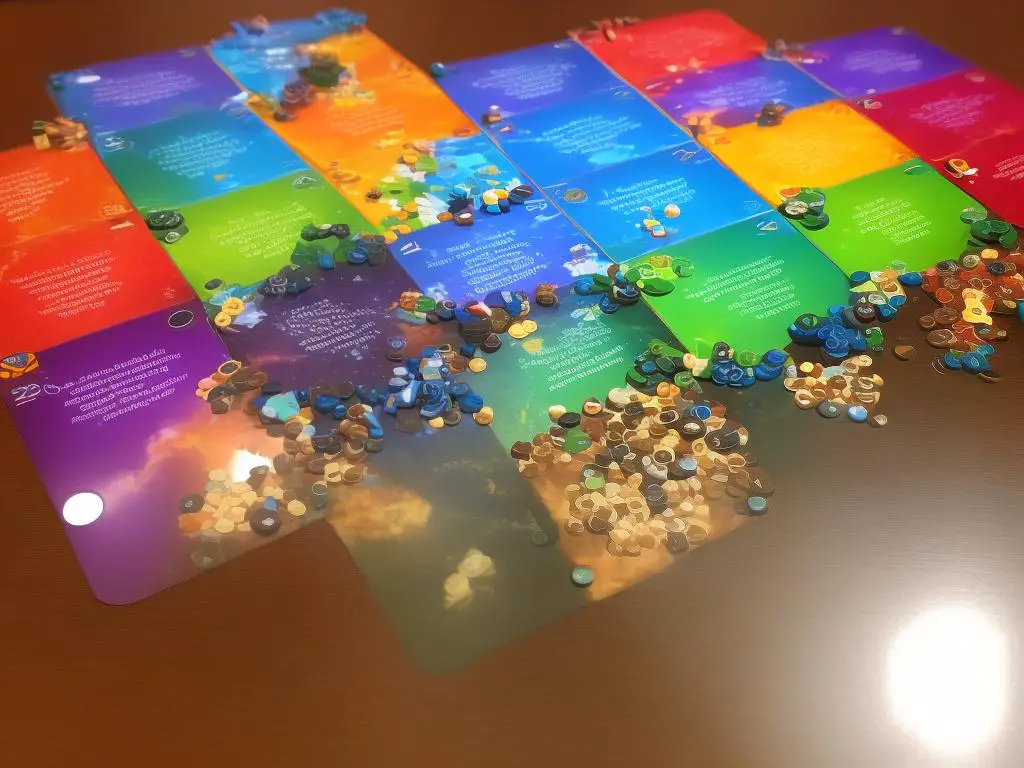
Building a balanced strategy
Introduction to 7 Wonders
7 Wonders is a board game where players take on the role of leaders of ancient civilizations, attempting to build impressive cities consisting of various structures. Throughout the game, players will need to make strategic decisions to construct a balanced civilization, ensuring a successful and thriving city. This guide will assist you in learning the different strategies that can lead you to victory in the 7 Wonders board game.
Focusing on Military Might
One possible strategy in 7 Wonders is to focus on building a strong military, which allows you to defeat your neighbors and gain valuable victory points. Military strength is represented by shield symbols on the cards. The key to this strategy is to consistently build military structures, especially in the later Ages.
Pros:
- Gain victory points by defeating your neighbors
- Force opponents to focus on military as well, potentially diverting their resources from other strategies
- Can be a straightforward and aggressive approach
Cons:
- Over-focus on military might can reduce investment in other areas of your civilization
- Can be countered by other players who also focus on military strength
Focusing on Scientific Advancements
Another strategy is to emphasize acquiring scientific advancements. This can involve collecting sets of the three different scientific symbols (gears, tablets, and compasses) to gain victory points. The more complete sets you have, the more points you score.
Pros:
- Exponential growth of victory points based on the number of sets
- Access to specialized technologies that can provide additional bonuses
- Opponents may not prioritize scientific advancements, leaving a clear path to victory
Cons:
- Can require time and resources to build an effective engine
- Lacks the brute force of military might, making you vulnerable to your neighbors
- May not be adaptable if needed cards are not available
Focusing on Resource Generation
Focusing on resource generation can provide you with a solid economic foundation, giving you access to virtually any card you need to build your civilization. Cards such as mines, farms, and markets will help generate resources like wood, stone, glass, and more.
Pros:
- Access to necessary resources to build structures
- Ability to trade resources with neighbors can provide additional income
- Forms a well-rounded base for other strategies
Cons:
- Does not directly contribute to victory points
- Can be a slow strategy with a lower risk but potentially lower reward as well
- Requires investment in structures that produce resources, taking up valuable space for potential victory points
Building a Balanced Strategy
Now that we’ve covered some individual strategies, let’s discuss how to balance them effectively for a successful civilization. A balanced strategy involves investing in multiple aspects of your civilization, not focusing solely on one area. This can prove more adaptable and potentially efficient.
Key Takeaways:
- Keep an eye on your neighbors: Observe what strategies your neighboring opponents are pursuing and react accordingly. It’s essential to adapt your game plan based on their choices.
- Identify your strengths: Assess the cards available to you and your starting wonders to determine your potential strengths and focus on capitalizing on them.
- Don’t neglect resource generation: Make sure you have a solid resource engine to support your civilization.
- Draft wisely: As 7 Wonders uses a drafting mechanic, try to draft cards that your opponents need as well to keep them from gaining an advantage.
- Stay flexible and adaptive: Remember, a balanced strategy may change throughout the game; be willing to adapt your focus based on the cards available and the actions of your opponents.
By implementing these tips and practicing your balanced strategy in 7 Wonders, you will be on your way to building a successful civilization and enjoying your many victories. Good luck!

Effective card drafting tactics
Introduction
7 Wonders is a popular card drafting and civilization building board game that challenges players to strategically pick and use cards representing various resources, buildings, and advancements to create the most successful city. The game is played over three Ages, during which players draft cards by selecting one card and passing their remaining hand to the next player. To become an expert 7 Wonders player and optimize your chances of winning, understanding and employing effective card drafting tactics is essential. Here’s a guide on how to do it.
Know Your Cards
Before diving into specific tactics, you should familiarize yourself with the different types of cards available and their roles in the game:
- Resource Cards: Provide necessary resources to build structures and generate new goods.
- Commercial Cards: Often grant trade benefits and additional resources, or coins.
- Military Cards: Strengthen your military power to compete against neighboring cities.
- Science Cards: Provide science symbols that grant significant points when collected in sets.
- Culture Cards: Offer immediate Victory Points (VPs) to advance your city’s greatness.
- Guild Cards: Grant bonus VPs based on other players’ achievements.
- Wonder Cards: Unique to each player, providing significant bonuses when constructed.
Balancing Your Draft
The key to successful drafting in 7 Wonders lies in striking a balance between pursuing your own strategy and denying valuable cards to your opponents. Here are some tactics to help you optimize your drafting choices:
1. Establish Your Strategy Early
Observe the unique abilities of your chosen Wonder, the starting resource you possess, and the early cards in your hand. Use these factors as a guide to determine your main focus, whether it’s science, military, commercial, or a balanced approach. Adjust your strategy throughout the game based on available cards, but having an early plan helps guide decision-making.
2. Focus on Resource Production
Resource cards allow you to build more advanced structures without depending on neighbors. By drafting essential resource cards, you’ll establish a strong foundation for building other cards and wonders. Additionally, securing resources your neighbors lack may force them to buy goods from you, supplying you with extra coins.
3. Deny High-Value Cards to Opponents
Monitor your neighbors and identify the cards that are crucial to their strategies. Denying valuable cards can disrupt your opponents’ progress, especially in regards to science and military. However, don’t focus too much on this strategy if it weakens your growth.
4. Utilize Late Age Abilities
Some cards, like Guild cards, become more valuable as the game progresses and player strategies solidify. Keep an eye on these cards and snatch them up when the opportunity arises to maximize their potential and get ahead.
5. Watch Your Neighbors’ Strategies
Pay attention to your opponents’ cards and resources, especially your direct neighbors. Knowing their weaknesses and strengths will help you make informed decisions about which cards to draft and which to pass.
6. Diversify Your Portfolio
Don’t rely solely on one type of card or strategy. Building a diverse array of cards and structures will keep you competitive even when your preferred card types are not available.
7. Don’t Overextend in Military
While collecting military cards can earn you VPs, winning battles in every Age isn’t required to be successful. Focus on other card types to ensure you’re not wasting valuable drafts on unnecessary military power.
Conclusion
Optimizing card drafting in 7 Wonders is a mix of strategic thinking, attentiveness to your opponents’ actions, and adaptability. By utilizing these tactics, you’ll be able to make the best possible choices for your city and increase your chances of leading it to greatness. Enjoy the game!
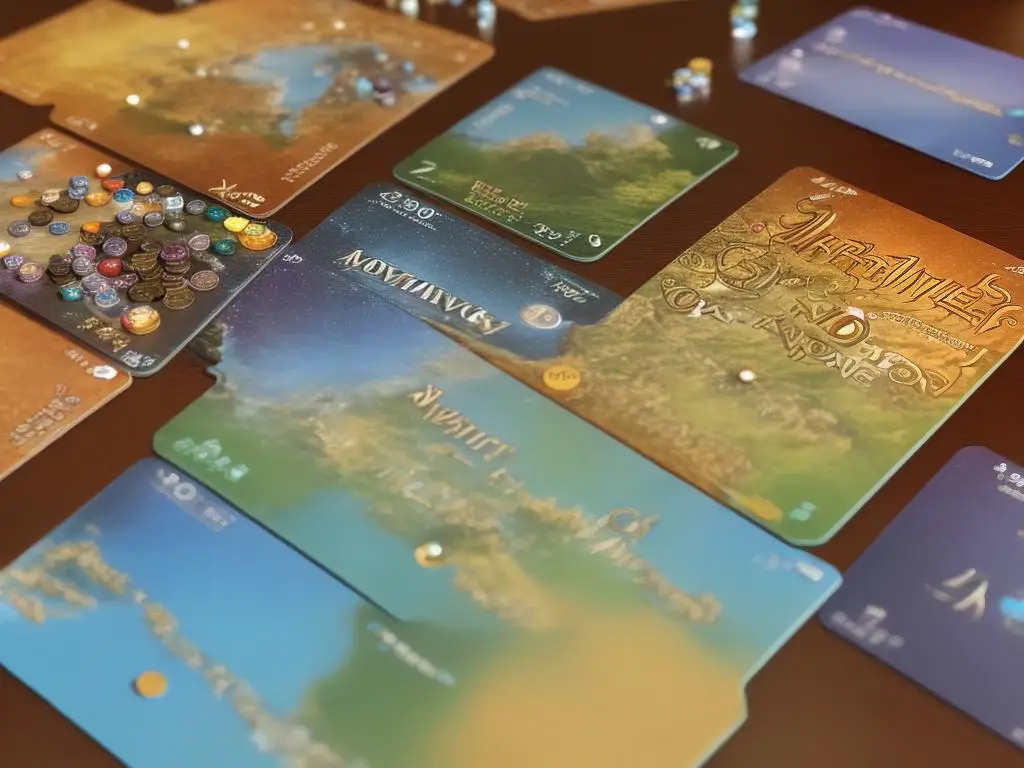
Utilizing Wonders effectively
Introduction to 7 Wonders Board Game
7 Wonders is a popular strategy board game where players take on the role of leaders of ancient civilizations, each with their own unique Wonder, to guide their cities through three Age decks to build structures, develop military, and gain victory points. The player with the most victory points at the end of the game wins.
Choosing Your Wonder
Each Wonder comes with unique abilities and bonuses. In order to utilize your Wonder effectively, it is important to choose one that complements your desired strategy. Some Wonders focus on resource generation, others on military or scientific advancements, while some provide additional victory points. It is crucial that you understand your Wonder’s unique abilities, strengths, and weaknesses to maximize its effectiveness.
Utilizing Wonders Effectively
Here are some general tips to get the most out of your chosen Wonder and its abilities:
- Understand Your Wonder’s Abilities: Read the details of your Wonder carefully and take note of its stages, resources, and special abilities. Some Wonders have abilities that can be used every turn, while others provide single-use bonuses.
- Plan Ahead: Knowing what resources your Wonder requires for each stage will help you prioritize your early game strategy. Secure the required resources early on so that you can build your Wonder and unlock its abilities as soon as possible.
- Balance Resources and Development: Although building your Wonder is important, it’s crucial not to neglect other aspects of the game, such as developing your technological advancements, increasing your military power, and joining in trading opportunities. Make sure to strike a balance between building your Wonder and other game aspects.
- Adapt to Your Opponents’ Strategies: Be aware of the Wonders your opponents have chosen and anticipate their strategies. For example, if your opponents both have military-focused Wonders, it might be a good idea to focus on boosting your defenses or adopting a different approach to avoid direct competition.
- Consider Timing: Building the stages of your Wonder may take several turns, and the game only lasts three Ages. Ensure that your chosen Wonder fits within the length of the game and that you’ll have enough time to fully utilize its abilities.
Anticipating and Countering Opponent Strategies
- Study Opponents’ Wonders: Familiarize yourself with all available Wonders and their abilities to help you predict your opponents’ strategies.
- Observe Opponents’ Resource Management: Keep an eye on the resources your opponents are collecting and trading. This can give you valuable insight into their immediate plans, such as their future purchases or whether they’re likely to build their Wonder stages soon.
- Block Opponent Progress: You may occasionally have the opportunity to hinder your opponents by taking a card they need or placing a strategic military threat. In such cases, consider whether denying your opponent a card is more valuable than picking a card for your own city.
- Coordinate with Neighbors: If you notice that other players are trying to collect the same resources as you, consider trading or selling your extra resources to them. This can help maintain a good relationship with your neighbor while still gaining a strategic advantage.
- Induce Rivalries: Encourage other players to compete with each other, particularly when it comes to military strength or technological advancements. If two or more players start competing, they might neglect other aspects of the game, leaving you with more opportunities to build your city and Wonder.
By understanding your chosen Wonder and employing strategic moves throughout the game, you can maximize your Wonder’s effectiveness and increase your chances of achieving victory in 7 Wonders. Remember that while Wonders can provide powerful bonuses, a well-rounded strategy encompassing all aspects of the game is key to success.

Understanding scoring mechanisms
Introduction
7 Wonders is a strategic board game designed for 2-7 players, and it revolves around the theme of developing and advancing your civilization. Each player begins with a Wonder board – representing an ancient civilization – and they collect resources, build structures, and establish military might over three Ages.
To win the game, you must accumulate the most victory points (VPs) by the end. Understanding the various scoring mechanisms and point values for each card type, Wonder stage, and other game elements is crucial for planning your winning strategy effectively. This guide will walk you through these scoring mechanisms to help you master the game.
Card Types and Scoring
- Blue Cards (Civilian Structures): The blue cards are intended to provide you with victory points. The points received from blue cards are indicated on the card itself (e.g., a card with a “3” symbol will grant three victory points). To maximize your points from blue cards, you should try to collect as many as possible and focus on higher-valued ones.
- Green Cards (Scientific Structures): Green cards offer victory points based on sets of identical and unique scientific symbols. These symbols come in three types: compass, tablet, and gear. Points are awarded in two ways:
- Identical symbols: You score points equal to the square of the number of identical symbols you own. For example, if you own three gear cards, you score 3×3 = 9 points.
- Sets of unique symbols: For each complete set of all three unique symbols, you score 7 points. Collecting sets of unique symbols can be a powerful way to accumulate points, especially when combined with duplicates.
- Red Cards (Military Structures): Red cards measure your military strength compared to your immediate neighbors. At the end of each Age, you’ll compare the number of military symbols (shields) you have to your neighbors. If you have more shields than a neighbor, you score victory points based on the Age (1st Age: 1 VP; 2nd Age: 3 VPs; 3rd Age: 5 VPs). If you have fewer shields, you receive a -1 VP penalty. Ties result in no points or penalties.
- Yellow Cards (Commercial Structures): Some yellow cards award victory points at the end of the game. Like blue cards, points received from yellow cards are indicated on the card itself. Other yellow cards provide additional resources or benefits but do not directly contribute to your victory point total.
- Purple Cards (Guilds): Guilds are only available in the third Age and offer variable victory points based on specific conditions displayed on the card. These conditions can be linked to various card types or other game elements, so plan your strategy accordingly.
Wonder Stages and Scoring
Each player’s Wonder board consists of three stages, each with a potential victory point value, resource costs, and other bonuses. To score victory points from your Wonder, you must construct these stages by paying the required resources. The point values are displayed on the Wonder board, and this can range from 3-7 VPs per stage. Completing all three stages of your Wonder can significantly boost your total victory points.
Bonus Points
- Gold Coins: At the end of the game, for each set of three coins you possess, you receive one victory point. While coins primarily serve as a resource for purchases and trades, they can also increase your final score.
- Defeated Neighbor Tokens (only applicable in 2-player games): When playing a 2-player game, you’ll use Free City cards to represent a third virtual player. When you have more military symbols than the Free City, you receive Defeated Neighbor Tokens. Each Defeated Neighbor Token provides one victory point.
Conclusion
To master the scoring mechanisms in 7 Wonders, familiarize yourself with the different card types and their associated point values, the Wonder stages, and bonus points. The key is to balance your strategy around collecting cards and resources that bring about the most victory points while keeping an eye on your opponents’ progress. Stay flexible in your approach and adapt to the cards available in each Age, and you’ll soon become a formidable contender in 7 Wonders.
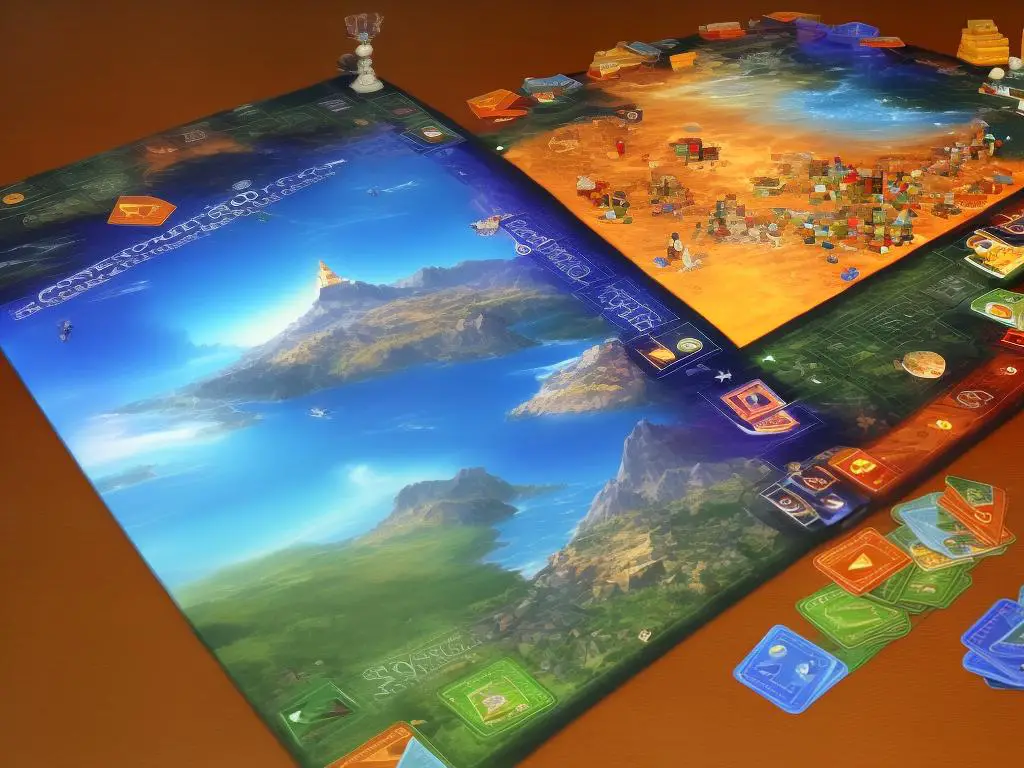
Enhancing gameplay with expansions
Introduction
7 Wonders is a strategy board game in which players must develop their civilizations across three ages by gathering resources, constructing buildings, and developing scientific advancements. With a variety of expansions available, you can enhance the gameplay and create a more diverse and engaging experience for everyone at the table. In this guide, we will discuss the expansions Leaders and Cities and how they can add new mechanics and strategies to your 7 Wonders game.
Leaders Expansion
The Leaders expansion introduces a new game phase, where players select and recruit leaders to support their civilization’s development. These leaders provide unique abilities and bonuses throughout the game, encouraging players to adapt their strategies based on the leaders they choose.
How to Integrate Leaders Expansion
- Setup: At the beginning of the game, shuffle the Leader cards and deal four to each player. Players privately choose one Leader card to keep and pass the remaining cards to the left. This process is repeated until each player has four Leader cards.
- Recruitment: Before each Age, players will have the opportunity to recruit one of their remaining Leader cards. To do so, they must pay the recruitment cost listed on the card and place it in their play area. Alternatively, players can sell a Leader card for three coins or use it to build a Wonder stage by discarding the card.
- Bonuses: Each Leader card grants unique abilities and bonuses, which may include resource generation, military strength, victory points, or discounts on construction costs. Players should carefully select and recruit leaders that align with their chosen strategy for maximum efficiency.
Cities Expansion
The Cities expansion adds new black cards representing cities and new mechanics that open up additional strategic options. Players can now engage in diplomacy, which provides them immunity from military conflicts and allows them to balance the risks and rewards of their military development.
How to Integrate Cities Expansion
- Setup: Determine the number of players and randomly select the corresponding number of City cards for each Age. Shuffle these City cards into the game’s Age decks.
- City Cards: City cards are black and represent various types of cities. These cards may grant additional resources, victory points, coins, or even directly affect other players. When a player drafts a City card, they must pay the construction cost and add it to their play area as they would with any other card.
- Diplomacy: Some City cards display a diplomacy symbol. When a player drafts a card with this symbol, they gain a diplomacy token. During the end-of-age military conflicts, a player with a diplomacy token is immune to losing victory points from military losses. However, the player also forfeits any victory points they would have gained for victories.
- Additional Rules: The Cities expansion adds a new rule regarding debt tokens. Some City cards and new Wonder boards may cause players to acquire debt tokens, which result in a loss of victory points at the end of the game. Players can pay off debt tokens by spending coins, which adds another layer of strategy in managing resources and victory points.
Conclusion
By integrating the Leaders and Cities expansions into your 7 Wonders gameplay, you can elevate the experience with new mechanics, strategic options, and depth. The addition of leader abilities and the diplomacy system encourages players to adapt their approach and consider their opponents’ actions more carefully, resulting in a more dynamic and engaging game for all.

Playing and analyzing gameplay
Introduction
7 Wonders is a strategic board game for 3 to 7 players that revolves around building ancient civilizations. Each player is tasked with constructing their own city and its various wonders while also trying to maximize their resources, military power, and scientific advancements. In this guide, you will learn the basics of the 7 Wonders board game and gain some knowledge on strategies you can utilize during gameplay. Once you have a strong understanding of the game, put your newfound skills into practice by participating in games with friends or online, and analyze your gameplay for areas of improvement.
Setup
- Each player chooses a Wonder board and corresponding set of Wonder cards. Each board represents an ancient city with its own unique abilities.
- Shuffle the Age cards for each age (I, II, and III) and create separate decks for each of the three ages.
- Deal seven cards from the Age I deck to each player. The cards should remain secret from other players.
- Separate the coins by value (1, 3, and 6) and place them nearby to form the bank.
Gameplay
The game consists of three ages (rounds), with each age composed of six turns. The players’ goal is to construct buildings, develop their military, advance their technology, and ultimately earn victory points (VPs). The game is played in a clockwise direction.
Turn Sequence
- Card selection: Each player secretly chooses one card from their hand to play during this turn and places it face down in front of them.
- Card reveal: Once everyone has chosen a card, all players reveal their cards simultaneously.
- Card resolution: Each player must now decide how to use their card. There are three options:
- A. Construct a building: Pay the building’s cost (found on the card) and place the card in your city. If you cannot afford the cost, you cannot construct the building.
- B. Build a stage of your wonder: Pay the cost indicated on your Wonder board for the next stage, and place your card underneath the corresponding slot on your Wonder board.
- C. Discard the card for coins: Discard your card to gain 3 coins from the bank.
- Card passing: Players pass the remaining cards in their hand to the player on their left (for Age I and III) or right (for Age II).
Card Types
When constructing buildings or developing your city, you will encounter various card types:
- Resources (brown and grey cards): These cards provide resources (wood, stone, clay, glass, papyrus, and ore) needed for constructing buildings or Wonder stages.
- Civilian Buildings (blue cards): These cards grant victory points, which contribute to your final score.
- Military Buildings (red cards): These cards give military power for battles against neighboring players.
- Scientific Buildings (green cards): These cards grant technology advancements in three categories: compass, tablet, and gear. Accumulating different combinations can provide a significant amount of victory points.
- Commercial Buildings (yellow cards): These cards grant coins, additional resources, or special abilities, such as trading with neighbors at a reduced cost.
- Guilds (purple cards): Guilds grant bonus victory points based on various conditions, such as how many military buildings your neighbors have.
End of an Age
After the sixth turn of each age, players must resolve a military conflict. You compare your military power to the players on your left and right, and depending on the outcome, you earn or lose victory points. After Age III is completed and all military conflicts are resolved, the game ends.
Scoring
Players’ scores are tallied by adding points from their civilian buildings, military victories, scientific advancements, guilds, and coins. Each player reveals their points, and the player with the most victory points is declared the winner.
Strategies and Analysis
As you gain experience playing 7 Wonders, focus on these strategic concepts:
- Resource management: Efficiently utilizing and acquiring resources is essential for constructing buildings and advancing your city’s development. Analyze your wonder and starting cards and plan your resource acquisition accordingly.
- City specialization: Focus on a particular area, such as military or science, instead of trying to be well-rounded in every category. This will generate higher points in specific areas and keep your opponents guessing.
- Neighbor awareness: Pay attention to what your neighboring players are constructing and try to deny valuable cards that may benefit them. Additionally, consider your opportunities for trading resources with neighbors, as trading can save resource costs.
Remember that regular practice and analysis of your gameplay will help you refine your strategies and improve your performance in 7 Wonders. So, gather your friends or find online communities to engage in this exciting game of strategy and civilization building. Good luck!
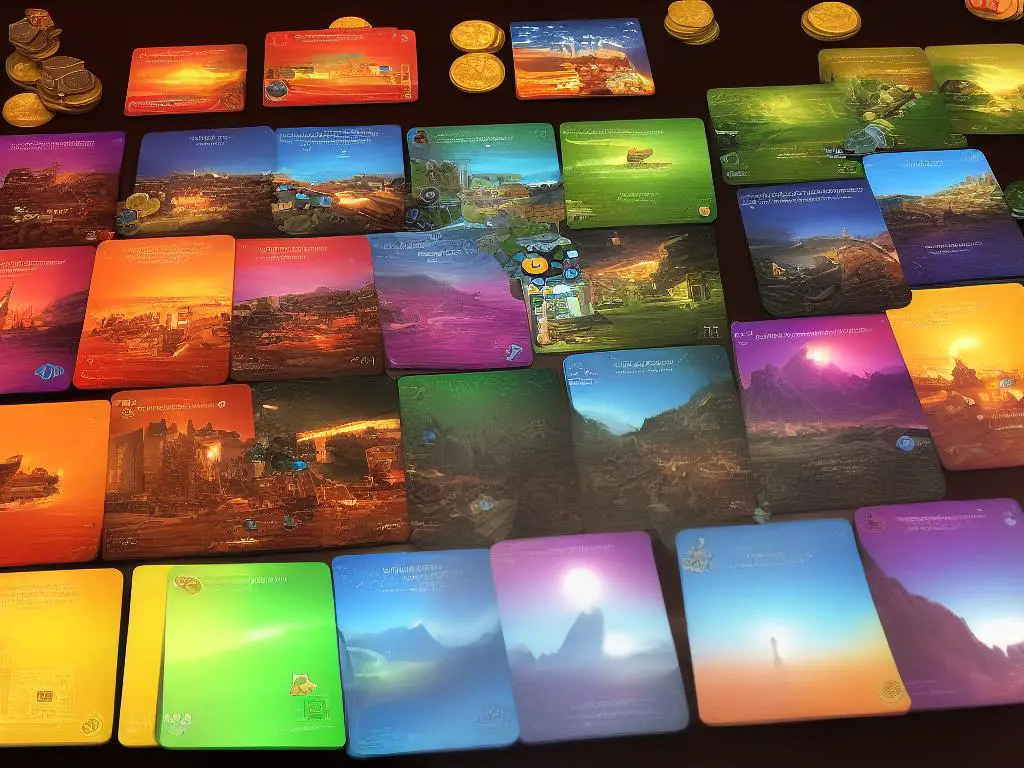
As you continue to play and analyze your gameplay, the strategies and insights detailed in this guide will help you hone your skills and achieve greater success in the captivating world of 7 Wonders. Challenge yourself by incorporating the game’s expansions and exploring the diverse abilities of Leaders and Cities while remaining versatile in the face of ever-changing circumstances. Ultimately, the key to achieving victory in 7 Wonders lies in your ability to balance various aspects of your civilization, outmaneuver your opponents, and forge a lasting legacy that will stand the test of time. The ancient world awaits – are you ready to rise to the challenge and make your own mark on history?